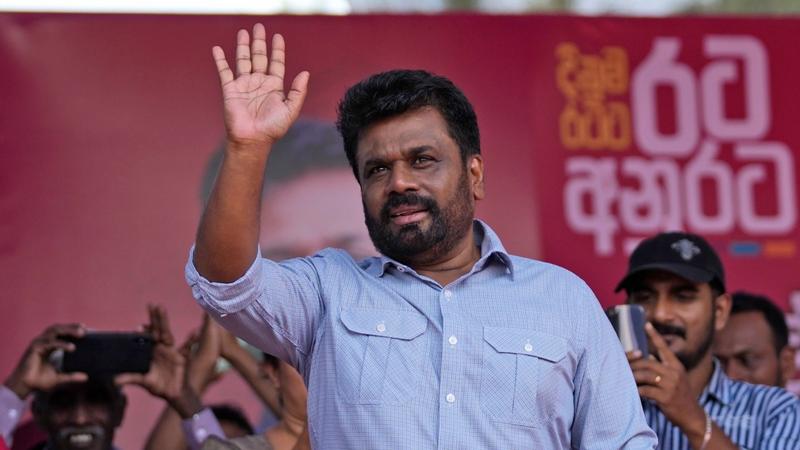Published 19:47 IST, September 22nd 2024
Anura Kumara Dissanayake Wins Sri Lanka Presidential Election
Anura Kumara Dissanayake Wins Sri Lanka Presidential Election

Sri Lanka Presidential election: Sri Lanka’s left-leaning leader, Anura Kumara Dissanayake, has emerged victorious in the presidential election, marking a significant shift in the political landscape of the debt-ridden island nation. Dissanayake described the outcome as a "vote for change.” In a historic first, Sri Lanka's presidential election on Sunday went into a second round of counting after no candidate secured over 50 per cent vote needed to be declared the winner. Anura Kumara Dissanayake of the Marxist Janatha Vimukthi Peramuna party's broader front National People’s Power (NPP) topped in the first round of counting by securing 5.63 million votes or 42.31 per cent, followed by Opposition leader Sajith Premadasa of Samagi Jana Balawegaya (SJB) with 4.36 million votes or 32.8 per cent of the total polled.
Who is Anura Kumara Dissanayake?
Anura Kumara Dissanayake, the newly elected president of Sri Lanka, is a prominent figure in the island nation’s political landscape, known for his left-leaning ideology and commitment to social justice. As the leader of the National People’s Power (NPP) and the Janatha Vimukthi Peramuna (JVP), Dissanayake has positioned himself as a voice for change, appealing to voters disillusioned by traditional political structures.
Early Life and Rise to Prominence
Born into a working-class family in Thambuttegama, Dissanayake’s political journey began during his student years in the 1990s, where he embraced Marxist ideas and became an influential student leader. His early activism set the stage for his future in politics. By 1998, he was elected to the JVP's decision-making body, the politburo, showcasing his rising influence within the party.
Dissanayake's first significant political breakthrough came in 2000 when he won a parliamentary seat. His career continued to ascend as he was appointed a Cabinet minister in President Chandrika Bandaranaike Kumaratunga’s government. However, he resigned from the position a year later, signaling his commitment to principles over political power.
In 2019, Dissanayake made his first bid for the presidency, receiving only about 3% of the vote. Undeterred, he refocused his efforts and rebuilt his political platform in the wake of the nation’s economic crisis.
Political Platform and Promises
Leading up to the recent election, Dissanayake campaigned on a manifesto aimed at breaking the “cycle of corruption and mismanagement” that has long plagued Sri Lankan politics. His NPP garnered support from citizens seeking systemic change and accountability among leaders.
In his campaign speeches, he highlighted the need for significant reforms in several critical areas, including education, public health services, and housing. Dissanayake criticized past administrations for failing to tackle the root causes of the economic crisis that has left many Sri Lankans struggling.
A pre-election opinion survey indicated strong support for Dissanayake, with 36% of voters expressing a preference for him, outpacing his rivals, including Sajith Premadasa and Ranil Wickremesinghe.
Anura Kumara Dissanayake’s victory marks a pivotal moment in Sri Lankan politics, as he seeks to address the pressing challenges facing the nation.
Sri Lankans voted on Saturday to elect a new president in the first election since the economic meltdown in 2022. Sri Lanka's presidential election uses a preferential voting system, where voters rank up to three candidates in order of preference. If a candidate receives more than 50 per cent of the first-choice votes, which is an absolute majority, that person is declared the winner. If not, a second round of counting will commence, with second and third-choice votes then taken into account.
No election in Sri Lanka has ever progressed to the second round of counting, as single candidates have always emerged as clear winners based on first-preference votes.
With inputs from agency
Updated 01:49 IST, September 23rd 2024




